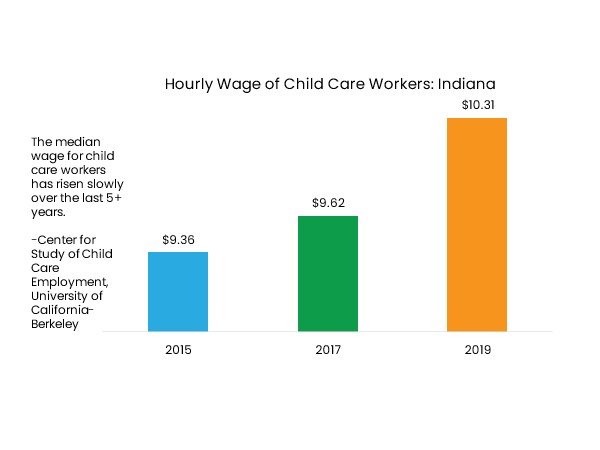Implementation Phase
TEAM RESOURCES HOME | ECOSYSTEM ESSENTIAL ELEMENTS: IN FOCUS | PAST TRAININGS | PUBLICATIONS | BLOG | TEAM DIRECTORY

Indiana Develops Child Care Business Competencies
Indiana implemented three action plan strategies to support child care business sustainability efforts including work to provide coordinated and comprehensive business knowledge training for child care entrepreneurs. Indiana’s Collaboratory team includes representatives from Early Learning Indiana, Shine Early Learning, and the Office of Early Childhood and Out-of-School Learning.
-
Indiana’s Build, Learn, Grow Stabilization grant program – funded through the federal American Rescue Plan Act – was designed to support the general operating expenses of child care businesses. By working closely with providers during the implementation of the grants, state administrators became aware that many child care entrepreneurs needed a stronger understanding of their programs’ operational costs. This experience highlighted the importance of building child care providers’ knowledge of best business practices.
-
Indiana’s SPARK Learning Lab led the development of child care business competencies. These competencies provide a common understanding of the baseline business knowledge needed to operate a sustainable child care business. The competencies help align business support across state agencies and organizations. Building on existing quality indicators and external examples from other states and organizations, SPARK facilitated a collaborative feedback process to engage partners and business owners in developing these competencies.
-
Education in business practices is essential to operating successful programs. Evaluation findings reflected:
• Budgeting trainings are needed across provider types. Offerings focused on budgeting practices are in demand as many providers struggle to break even or track their revenue and spending. Trainings focused on staff retention practices are also interesting to providers.
• Business competencies should be customized to each provider type. Tailoring competencies to specific audiences is critical. Competencies must be flexible to account for changing and varying needs, such as differing provider experiences in rural and urban areas.
• Share the “why.” Along with the competencies, sharing why business practices matter is essential. Give concrete examples of the benefits and show how practices such as using accounting software can help programs operate more efficiently.
• Listen to the field. Feedback from child care entrepreneurs contributed to the success of the initiative. The SPARK team surveyed child care businesses to learn what was needed and what the resulting competencies should look like. The team also considered how business competencies and associated education and training can be sustainable long term. These materials will continue to be refined and must be adaptable to changes.






